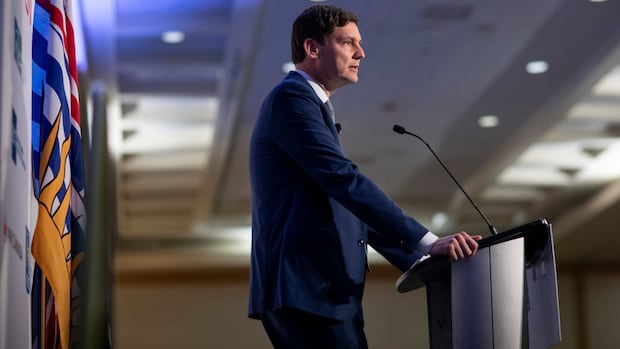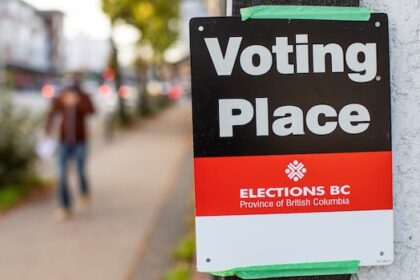British ColumbiaCouncillors in two B.C. communities are welcoming the premier’s announcement of involuntary care facilities amid public safety concerns, even as a drug policy academic says forcing people into drug treatment is ineffective.Prince George and Surrey councillors welcome spaces for involuntary care, but advocate and academic concernedAkshay Kulkarni · CBC News · Posted: Sep 27, 2025 5:56 PM EDT | Last Updated: 6 hours agoB.C. Premier David Eby, seen here earlier this year, announced on Friday that 100 new involuntary care beds are coming to Prince George and Surrey. The announcement has drawn praise from local councillors in those communities, even as advocates express concern over the province’s approach. (Ben Nelms/CBC)Councillors in two B.C. communities are welcoming the premier’s announcement of involuntary care facilities amid public safety concerns, even as a drug policy academic says forcing people into drug treatment is ineffective.B.C. Premier David Eby announced Friday at the Union of B.C. Municipalities (UBCM) convention that Surrey and Prince George would receive involuntary care facilities, though he said exact details would come later.In making the announcement, Eby directly referenced one of the central issues of UBCM — municipalities’ concern over public disorder and drug use — as the reason for the 100 new involuntary treatment beds between both communities.Surrey and Prince George councillors expressed relief over the announcement, saying that there’s an urgent need for addiction treatment in both regions.WATCH | Eby announces involuntary care beds: B.C. Premier David Eby announces two new involuntary care sitesB.C. Premier David Eby addressed the Union of B.C. Municipalities conference with a promise of more involuntary care beds to treat mental health and addictions. As Katie DeRosa reports, it was one of few spending promises, as the province struggles financially.”Quite honestly, almost sobs of relief,” said Prince George Coun. Trudy Klassen.”This is certainly not the end of what we need to do, but it is an excellent beginning.”Prince George Coun. Trudy Klassen was supportive of the new involuntary treatment beds, but acknowledged it wasn’t a silver bullet to deal with public disorder. (CBC)Klassen said that the lack of an involuntary care facility in Prince George, which serves as a hub for many services in B.C.’s north, was leading to an overuse of hospital beds and straining other health-care services.”All we have is hospital beds for psychiatric patients,” she said. “They’re only supposed to be there for two weeks and that isn’t long enough to treat someone who needs more care.”WATCH | Who qualifies for involuntary care? Who gets admitted to involuntary care spaces? Mental health advocate calls for transparencyB.C. Health Minister Josie Osborne says the new ‘home-like’ involuntary care space at Alouette Homes in Maple Ridge is designed for individuals who are certified for long-term involuntary care under B.C.’s Mental Health Act. Jonny Morris, the CEO of the Canadian Mental Health Association’s B.C. division, tells BC Today host Michelle Eliot the province needs to be precise about who qualifies for this kind of care — whether it’s people who are taken off the streets or those already in the system but need a more suitable alternative. Surrey Coun. Linda Annis said she was pleased to learn of the promised facilities but said it’s just the “tip of the iceberg” in terms of what is needed.She added that in Surrey, B.C.’s second-largest city by population, there’s a general need for more housing and social services.Linda Annis, a Surrey city councillor, is seen last year. She said that the premier’s announcement was the tip of the iceberg in terms of how many involuntary care beds were needed across B.C. (Shawn Foss/CBC)Annis attributed the city’s street disorder to people who are “out on the street” but who should, instead, “be in care.””It’s not fair to the individuals, and it’s not fair to the businesses and residents that are enduring some of the negative activity as a result of this.”Advocate concernedDJ Larkin, executive director of the Canadian Drug Policy Coalition, questioned the government’s focus on involuntary care, saying that involuntary care should be a clinical decision and not a political one.”Homelessness is a structural issue caused by government, and … what is being called disorder is public suffering,” Larkin said.”Detaining someone against their will is not a response to public suffering.”A person walks past a sign near Lafarge Lake in Coquitlam, B.C., commemorating those lost to the toxic drug crisis. DJ Larkin of the Canadian Drug Policy Coalition said that blaming people who are suffering for street disorder ignores the structural problems and government decisions at play. (Ben Nelms/CBC)Larkin said that the government should look at improving the quality of voluntary care, which could help drug users get help before they overdose multiple times and get brain injuries.The advocate added that the coalition had concerns with B.C.’s addiction treatment facilities, saying that regulation was spotty for facilities that are often for-profit and advocate an abstinence-based approach to care.”We understand that municipalities may be frustrated, but the question again is, ‘Did we create the conditions where all of us can thrive?'” Larkin said.”And if the answer is ‘No,’ we should not be blaming the people who are suffering.”Kora DeBeck, a professor at Simon Fraser University’s school of public policy who specializes in research on the toxic drug crisis, says that forcing someone into treatment is ineffective. (CBC)Kora DeBeck, a professor at Simon Fraser University’s school of public policy, said she welcomed the funding — but that pushing someone into involuntary care against their will is ineffective.”When we push them into an involuntary treatment setting, their tolerance for opiates goes down,” she said.”And if they have a relapse, they’re much more likely to to die.”DeBeck said research showed that more treatment alone would not solve the issue of public drug use, saying a safer supply and alternatives to toxic drugs would help.”The more that we can give people alternatives to toxic drugs, the more that we can give them some stability and some support,” she said. “I think from a community’s perspective, they would see a lot of changes.”ABOUT THE AUTHORAkshay Kulkarni is an award-winning journalist who has worked at CBC British Columbia since 2021. Based in Vancouver, he is most interested in data-driven stories. You can email him at akshay.kulkarni@cbc.ca.With files from Tanushi Bhatnagar, Johna Baylon and The Canadian Press
Mixed reaction to B.C. premier’s announcement of new involuntary care facilities











